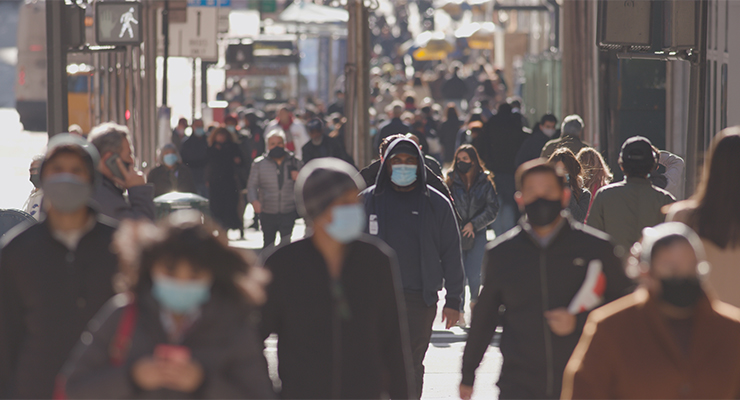
Nearly two and a half years on from the start of the pandemic, we still don’t have an agreed definition of long COVID. Referred to by those of us in the medical community as post acute sequelae of COVID-19, or PASC, we also don’t know why it happens. Women and diabetics seem to be at increased risk of developing it, but a definitive list of risk factors is yet to emerge.
With more cases of COVID-19 circulating in Australia than ever before, what do we know about PASC, and how worried should we be about getting it?
Syndromes and unknowns
COVID-19 is capable of causing damage to all of the body’s major systems, including the heart, lungs, kidneys, gastrointestinal and neurological systems. Long COVID is the experience of persistent symptoms beyond four weeks (most commonly fatigue, shortness of breath and generalised aches) in the absence of organ damage or dysfunction.
In a way, ‘PASC’ is similar to ‘IBS’, or irritable bowel syndrome. Often a diagnosis of exclusion, IBS is the term used to explain persistent gastrointestinal symptoms when no other diagnosis can be proven. Just like PASC and other things appended with the word “syndrome”, we don’t know what causes IBS — it’s just a cluster of symptoms in the absence of a more tangible diagnosis.
Just like chronic pain and chronic fatigue syndrome, IBS symptoms are influenced by a number of factors, including stress. A uniquely frustrating feature of these syndromes, and PASC, is the daily experience of debilitating symptoms from an invisible and inexplicable enemy.
Inflammatory theories
Those with long COVID can have elevated inflammatory markers months after infection, suggesting it may be driven by a persistent inflammatory state, however, this is just one of many proposed biological mechanisms. Another possibility is subtle lung scarring, undetectable by the usual chest imaging methods of X-ray and CT scans but visible on MRI, as reported in the journal Radiology last month.
Vaccination allows the body, upon infection, to respond with a swift but milder inflammatory response, preventing severe disease and the organ scarring that can follow an aggressive inflammatory response. Vaccination is our best line of defence against the short- and long-term effects of COVID-19 — and in general the more doses the better.
One UK study compared the risk of PASC between the delta and omicron variants. Among double-vaccinated people, the risk of PASC following omicron infection was half that following delta. Among triple-vaccinated people, there was no difference in the risk of PASC between the two variants.
One conclusion from this finding could be that a third vaccine provides much more protection against delta-induced PASC. Alternatively, it may suggest that the syndrome of PASC occurs independent of the host’s immune status and inflammatory response, contradicting the proposed mechanisms above.
Other pieces of evidence also defy a biological explanation, such as the finding that US patients with commercial insurance (who ostensibly received “better quality” care) were more likely to develop PASC than their less affluent, Medicaid-sponsored peers.
Never mind
Like the other syndromes influenced by stress and anxiety, it is possible that long COVID is, if not entirely then at least partly, the physical manifestation of psychological trauma — the fear of COVID and PASC as a self-fulfilling prophecy.
That is not to say long COVID doesn’t exist or that it’s all in your head — it takes just one look at footage of traumatised WWI soldiers to see that psychological trauma can cause profound physical symptoms. Psychological support is regularly cited as a key part of treating PASC.
Even if this theory proves to be completely incorrect, it is the most relevant at this point in time because, besides vaccination, it presents the only additional option for prevention. That is, try not to think about it.
The known risk factors are not modifiable without the use of a time machine. COVID-19 is everywhere, and unless you’re staying home indefinitely, infection is likely.
Those living with PASC can hopefully find comfort in the increasing body of evidence showing that symptoms do improve or resolve over time. For those currently or recently infected by COVID-19, you’ve got no other option and nothing to lose by just saying fuhgeddaboudit.








I am not a medic but from experiences of people I know, viruses can trigger auto-immune illnesses of which presumably long Covid is one. Also it seems that women are more susceptible to auto-immune illnesses and possibly even more so after menopause.
From the medical literature and published papers to date.
Stellenbosch University has done ground breaking research and it does confirm that “Long Covid” is not just a post viral syndrome, it is sequential damage done by the initial inflammatory response to this virus.
The blood of people with long Covid have increased clotting factors and on high magnifications there are fine clots made with fragments of platelets.
Long Covid takes 3 months to 6 months to manifest as the fine clots block very fine vessels in the brain, kidney and pancreas depositing amyloid plaque as it clogs the fine blood vessels of what ever organ or organs it has decided to be attracted to.
The Cambridge University bio bank MRI brain scans now have visual proof of scarring in the cognitive and impulse areas.
This was achieved by Cambridge contacting all their volunteers who had already had an MRI for the Normal brain bank, asking those who had had Covid19 and were suffering from “brain fog”. A terrifying “Before and After” sequences.
The Mayo Clinic starts people on heavy duty blood cells anti- platelet therapy for 3 months followed by dialysis and gets some improvement in the fatigue component.
They also exercise is contra-indicated because it cause the inflammatory response to increase thus leading to more damage.
Strangely, exercise physiologists are running Australia’s only Covid19 rehabilitation units..
I did the publications research for someone writing an educational program for GP”s.
Please feel free to disagree with any finding that I have found in peer reviewed published papers or provide a different series of peer reviewed publications, that may support any other hypothesis.
Exercise has a place in our sedentary society, however, placing exercise physiologists in charge of the rehabilitation of people with a progressive inflammatory scarring is a bit like asking them to rehabilitate someone with an unset compound fracture with exercise.